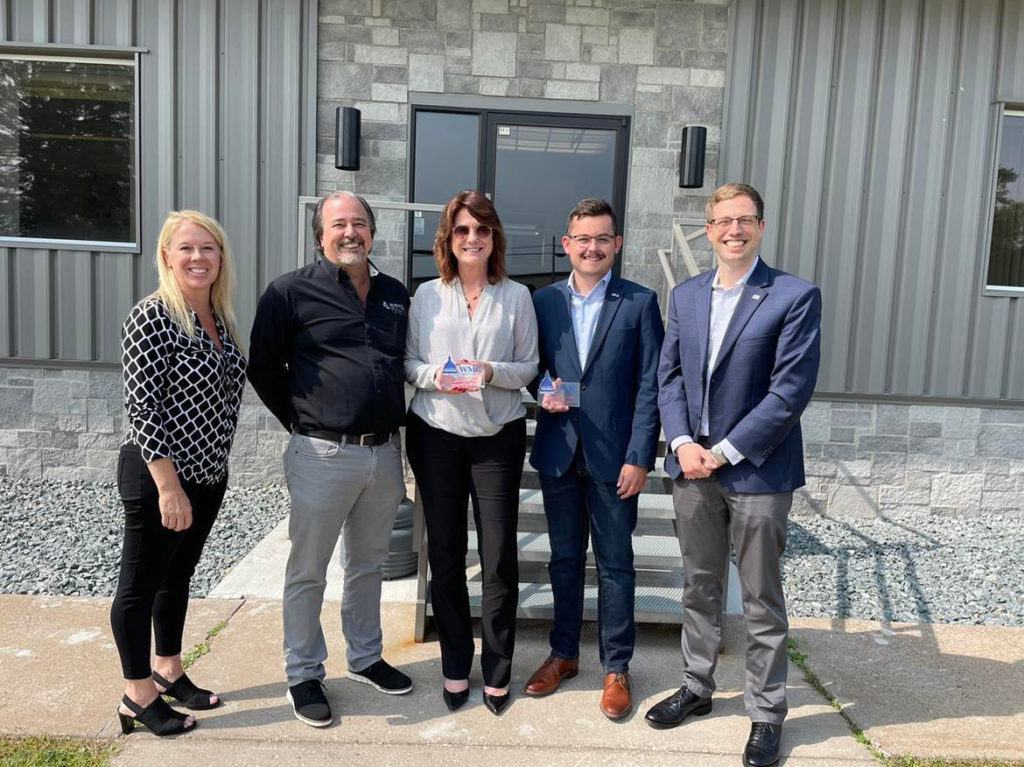
By Jalen Maki
MMC STAFF
Wisconsin Manufacturers & Commerce (WMC) announced on Friday, Sept. 16, 2022, that State Senator Mary Felzkowski (R-Tomahawk) and State Representative Calvin Callahan (R-Tomahawk) had received its Working for Wisconsin Award.
WMC is a Madison-headquartered association of manufacturers, service businesses, and chambers of commerce.
The Working for Wisconsin Award “recognizes legislators who supported specific pro-growth policies and earned a high rating on WMC’s biennial legislative scorecard,” WMC said.
“The Working for Wisconsin Award is based on individual voting records, regardless of a legislator’s partisan affiliation,” WMC stated. “Legislators who earn the award each session supported pro-growth policies and reforms aimed at improving the state’s business climate. All Wisconsin legislators are considered for the award, but it is only earned by those who consistently vote to make Wisconsin a better place to do business.”
The WMC Legislative Scorecard shows how many WMC-backed bills each lawmaker voted for and against during the most recent legislative session. To be eligible for the Working for Wisconsin Award, a legislator is required to have voted for at least 70% of the legislation supported by WMC.
More than 80 GOP lawmakers were described as being “pro-business” in the scorecard, voting in favor of between 85% and 100% of WMC-backed bills.
No Democratic legislators met the 70% threshold to be eligible for the award for the 2021-2022 legislative session, according to the scorecard. State Senator Don Vruwink (D-Milton)’s 35% was the highest among Democratic lawmakers.
In a pair of releases, WMC said Felzkowski and Callahan were honored for their work during the most recent legislative session.
Scott Manley, WMC Executive Vice President of Government Relations, said Felzkowski and Callahan have “shown a continuous commitment to growing our economy and attracting and retaining a talented workforce,” adding that WMC looks forward to working with the Tomahawk legislators to “make Wisconsin the best state to live, work, and play.”
“Wisconsin is fortunate to have so many legislative leaders who consistently vote to improve our state’s business climate,” said WMC President and CEO Kurt R. Bauer. “When legislators actively work to improve our state’s tax, regulatory, and legal climate, it fosters an environment where Wisconsin’s economy can flourish.”
WMC Legislative Scorecard
The WMC Legislative Scorecard lays out legislation the association supported and opposed during the 2021-2022 legislative session.
According to the scorecard, WMC backed Assembly bills that sought to provide immunity for businesses from civil liability for death, injury, or damages arising from COVID-19 in the course of business; restrict the governor from declaring additional public health emergencies related to COVID-19, except if the receipt of federal COVID-19 pandemic aid required an active state-declared emergency or disaster; prohibit most able-bodied adults without dependents from knowingly failing to accept an employment offer or an increase in work hours or wages in order to retain Medicaid benefits; and eliminate personal property tax. These bills were ultimately vetoed by Governor Tony Evers.
Assembly bills regarding the termination of enhanced federal unemployment insurance benefits, PFAS cleanup grants, FoodShare work requirements, and consumer data privacy regulations were also supported by WMC.
WMC opposed Assembly legislation seeking to accept Medicaid expansion under the Affordable Care Act; double the state’s energy tax from 1.2% to 2.4%; repeal the state’s “right-to-work” law, which prohibits an employer and labor organization from entering into an agreement that requires membership in a labor organization as a condition of employment; and partially repeal Act 10, a 2011 law affecting collective bargaining, compensation, retirement, health insurance, and sick leave of the state’s public sector employees.
Senate bills receiving backing from WMC sought to provide a deduction for tuition expenses for an apprenticeship program; require that schools administer reading assessments in 4K through second grade in order to identify “at risk” students and require a school to prepare a personal reading plan for each “at risk” student; and provide a permitting exemption for herbicide treatments for small, private ponds. These bills were ultimately vetoed by Evers.
To view all Working for Wisconsin Award winners and the full WMC Legislative Scorecard, visit www.bit.ly/3f4nkwX.
